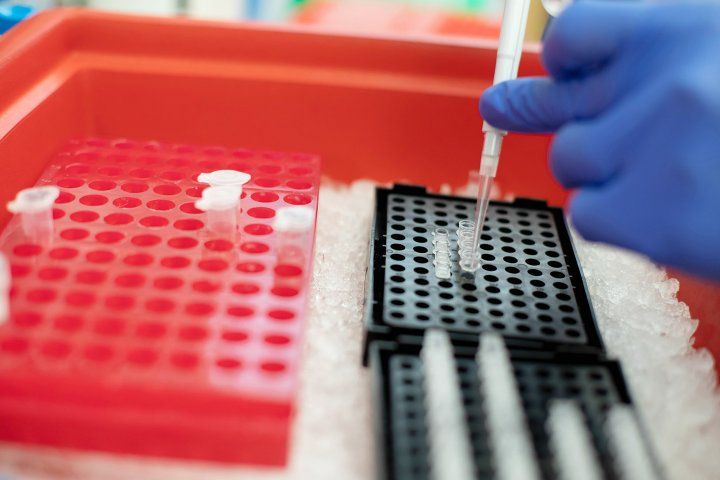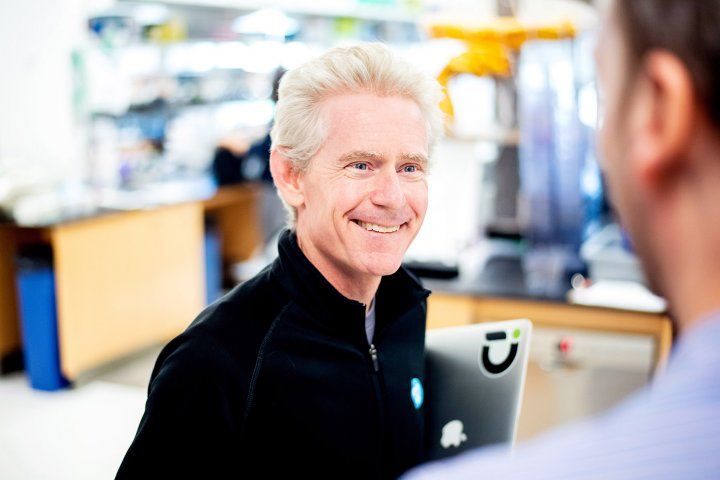UCSF to Offer Free COVID-19 Test Analysis, Results to Public Health Departments of Nine Bay Area Counties
Departments Can Now Send Samples for Analysis to UCSF Lab Supported by CZ Biohub, Chan Zuckerberg Initiative

Editor’s Note: Please find the updated release about UCSF’s offering of COVID-19 sample analysis for California’s Departments of Public Health »
Following a recent expansion of its COVID-19 test processing capacity at a new diagnostic laboratory adjacent to the Chan Zuckerberg Biohub (CZ Biohub), UC San Francisco will offer COVID-19 sample analysis for 30 days, free of charge, to all nine Bay Area counties’ Departments of Public Health (DPH). The county DPH offices that are now eligible to send samples to UCSF are Alameda, Contra Costa, Marin, Napa, San Francisco, San Mateo, Santa Clara, Solano and Sonoma.
The new UCSF lab, launched last month with the support of CZ Biohub and the Chan Zuckerberg Initiative (CZI), tested its first samples from COVID-19 patients on March 20, and it now is able to process more than 2,000 samples per day, returning results in as little as 24 hours. The additional testing capacity made possible by the new CZ Biohub-supported expansion lab has effectively doubled UCSF’s growing testing capacity, to nearly 3,000 samples per day.
“In response to this emergency, UCSF has significantly expanded its Clinical Laboratories’ capacity to test for the virus in samples from patients suspected of having COVID-19,” wrote UCSF Health President and CEO Mark R. Laret and UCSF Chancellor Sam Hawgood, MBBS, in an April 7 letter to DPH officials in the nine counties. “We are pleased to now be able to offer our mutual aid in this time of crisis to all nine Bay Area counties’ Departments of Public Health by providing them with the ability to send samples to UCSF for COVID-19 results at no charge.”
The ability to offer sample analysis and test results free of charge to DPH officials in the nine counties is made possible by philanthropic support for the lab from CZI, founded by Priscilla Chan, MD, and Mark Zuckerberg in 2015.
UCSF’s new lab was also enabled by an executive order from California Gov. Gavin Newsom that provides flexibility in some state regulations governing how diagnostic laboratories are staffed. After the governor’s order, UCSF and the CZ Biohub were able to rapidly build out the lab with the help of hundreds of UCSF graduate student and staff volunteers, and to acquire the first test results from patient samples within just eight days.

CZ Biohub co-President Joe DeRisi, PhD
“Our teams have been working around the clock to fight this pandemic with everything we have,” said CZ Biohub co-President Joe DeRisi, PhD, also a professor of Biochemistry and Biophysics at UCSF who contributed to the identification of the SARS coronavirus in 2003. “We have amassed a volunteer force of over 200 dedicated graduate students and scientists dedicated to processing test samples with the ultimate goal of limiting the spread of COVID-19.”
The CZ Biohub-supported COVID-19 testing lab expansion was launched through a close partnership with the UCSF Clinical Microbiology Laboratory, led by Senior Medical Director Ed Thornborrow, MD, PhD; Director Steve Miller, MD, PhD; and Associate Director Charles Chiu, MD, PhD.
“We are thrilled to partner with UCSF, the CZ Biohub, and CZI to expedite the processing of tests across the Bay Area and utilize the high capacity and speed of this expanded lab,” said Charity Dean, MD, assistant director of the California Department of Public Health and co-chair of Gov. Newsom’s COVID-19 Testing Task Force. “Our goal is to make sure that anyone who needs a test can get one. This effort will go a long way in helping us get there.”
California Gov. Gavin Newsom said, “Increasing testing capabilities throughout California is one of our highest priorities to help combat this pandemic, and this collaborative effort is an important step towards addressing the state’s existing backlog. We are thankful to UCSF, the Chan Zuckerberg Initiative, and the Chan Zuckerberg Biohub for their quick actions in response to this public health crisis in the San Francisco Bay Area, and we value their partnership during this global health emergency.”
About UCSF: The University of California, San Francisco (UCSF) is exclusively focused on the health sciences and is dedicated to promoting health worldwide through advanced biomedical research, graduate-level education in the life sciences and health professions, and excellence in patient care. UCSF Health, which serves as UCSF's primary academic medical center, includes top-ranked specialty hospitals and other clinical programs, and has affiliations throughout the Bay Area.
About the Chan Zuckerberg Initiative: Founded by Dr. Priscilla Chan and Mark Zuckerberg in 2015, the Chan Zuckerberg Initiative (CZI) is a new kind of philanthropy that’s leveraging technology to help solve some of the world’s toughest challenges – from eradicating disease, to improving education, to reforming the criminal justice system. Across three core Initiative focus areas of Science, Education, and Justice & Opportunity, we’re pairing engineering with grant-making, impact investing, and policy and advocacy work to help build an inclusive, just and healthy future for everyone. For more information, please visit chanzuckerberg.com.
About the Chan Zuckerberg Biohub: The Chan Zuckerberg Biohub is a nonprofit research organization setting the standard for collaborative science, where leaders in science and technology come together to drive discovery and support the bold vision to cure, prevent or manage disease in our children’s lifetime. The CZ Biohub seeks to understand the fundamental mechanisms underlying disease and to develop new technologies that will lead to actionable diagnostics and effective therapies. The CZ Biohub is a regional research endeavor with international reach, where the Bay Area’s leading institutions – the University of California, Berkeley, Stanford University and the University of California, San Francisco – join forces with the CZ Biohub’s innovative internal team to catalyze impact, benefitting people and partnerships around the world. To learn more, visit CZBiohub.org.